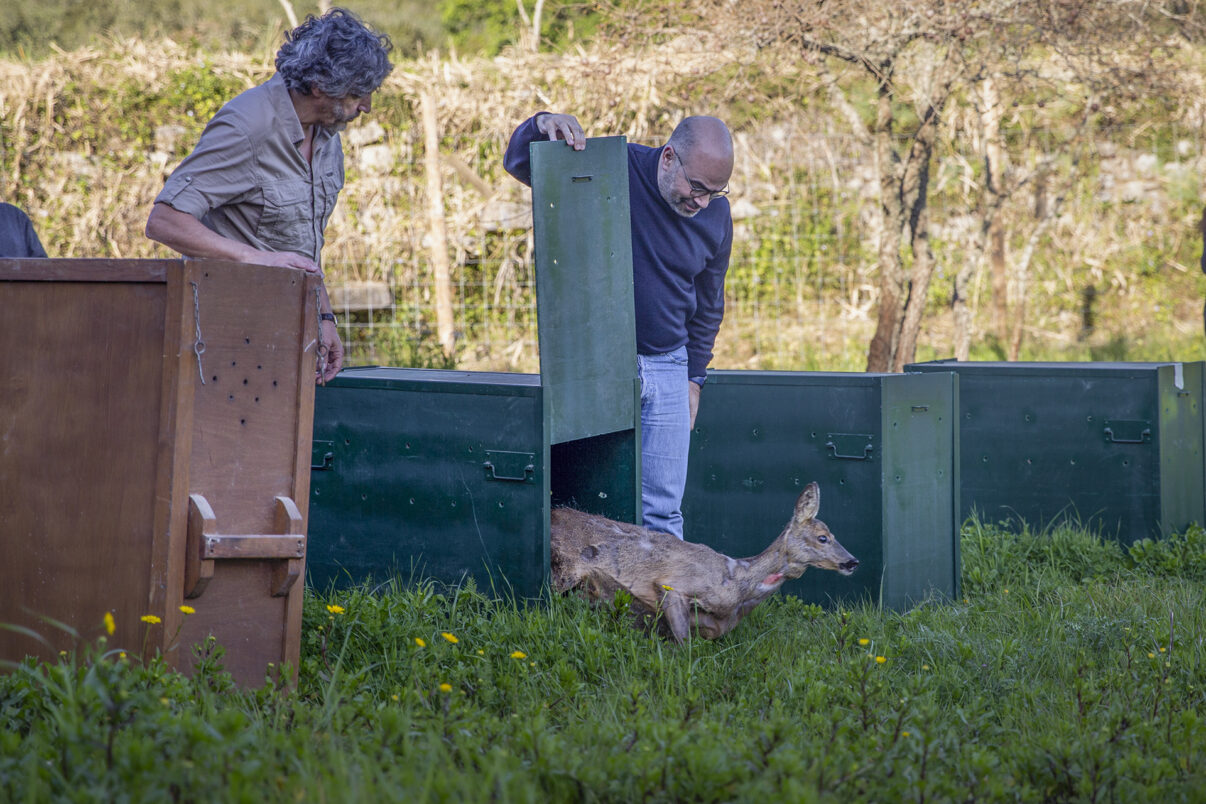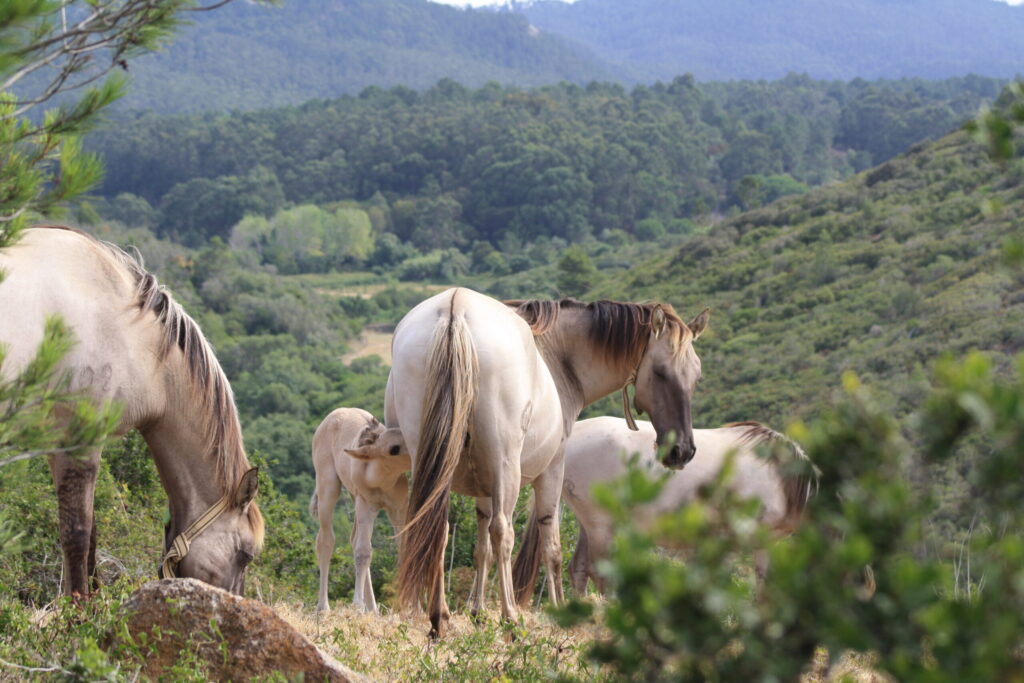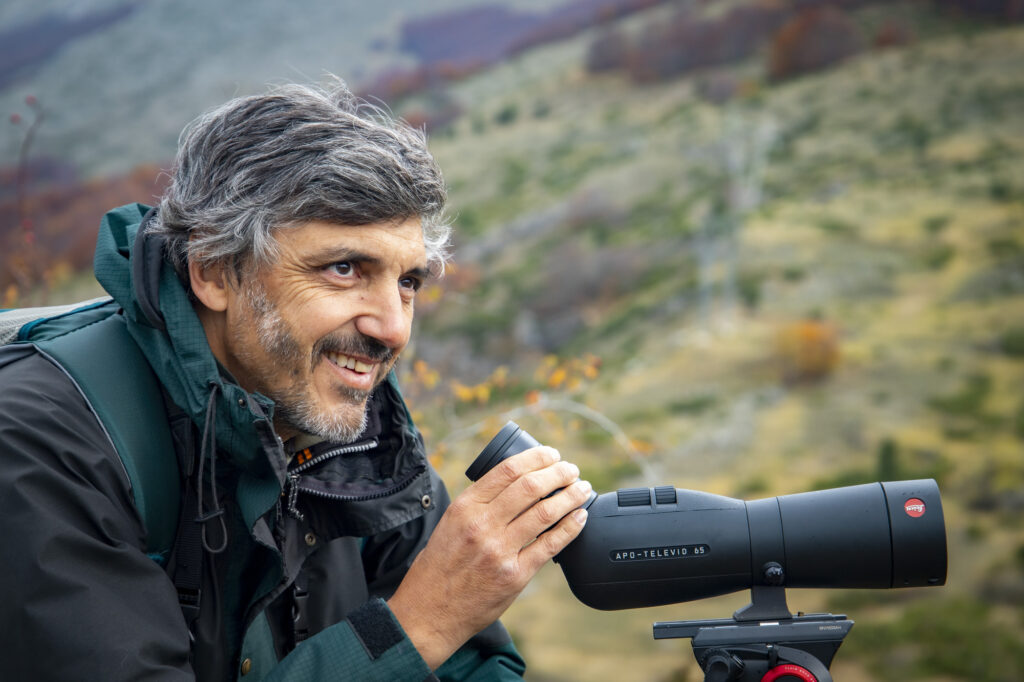A grant from Rewilding Europe’s European Wildlife Comeback Fund has enabled the translocation of roe deer and Sorraia horses to Sintra-Cascais Natural Park in central Portugal. In conjunction with other herbivores, the animals will help to enhance biodiversity, mitigate wildfire risk, and support the growth of nature-based tourism.

Towards a healthier and more functional landscape
The Quinta do Pisão rewilding initiative, which is part of the Sintra-Cascais Natural Park and a member of Rewilding Europe’s European Rewilding Network, is located on the outskirts of the Portuguese capital Lisbon in the municipality of Cascais, close to the Atlantic coast. The abandonment of agriculture and associated decline in livestock in the 1960s, coupled with the introduction of non-native vegetation, has seen the landscape became highly susceptible to catastrophic wildfire, and severely restricted the diversity of local flora and fauna.
To enhance the ecological and socio-economic value of the park, rewilding efforts in Sintra-Cascais are currently focused on increasing natural grazing using a range of wild and semi-wild herbivores. A 57,000 euro grant from Rewilding Europe’s European Wildlife Comeback Fund has enabled the rewilding team to purchase four roe deer and three Sorraia horses, which were brought to the park in March and are currently being kept in an acclimatisation enclosure. They will eventually be released into a far more extensive rewilding area, where their grazing and browsing will reduce the quantity of combustible vegetation, thereby lowering the risk of wildfire. By opening up the landscape and increasing the diversity of plant species, they will also make the area more attractive to animals such as rabbits and partridges.
“The overall objective is to reintroduce ecological complexity into the habitat,” explains João Cardoso de Melo, Ecological Infrastructure Management Director of the municipal company managing the park. “Through natural grazing we can recover ecosystem balance and restore food webs, which will make the landscape healthier, more resilient, and better able to deliver a range of benefits to people.”
Herbivores in partnership
The European Wildlife Comeback Fund grant will also be used to join two separate areas of Quinta do Pisao together. This will enlarge the overall rewilding area to 250 hectares and enhancing landscape connectivity through fence removal. With the arrival of the latest herbivores, Quinta do Pisao is now home to 12 Sorraia horses, Garrano ponies, roe deer, and Miranda wild donkeys. A herd of six or seven red deer and a herd of five Maronesa cows (a traditional Portuguese breed of mountain cattle) will also be reintroduced in the near future.
“Grazing and browsing by all of these animals will benefit the landscape in a complementary way,” explains João Cardoso de Melo. “The positive impact will grow as populations naturally increase. The European Wildlife Comeback Fund grant will also allow us to monitor some of the animals with GPS collars to evaluate this impact, and to ensure they have enough to eat.”

Pioneering coexistence
With its peri-urban setting, Quinta do Pisao and the wider Sintra-Cascais Natural Park are well-used by local residents and visitors for leisure activities such as running, cycling and hiking.
“Rewilding an area so close to a large city is unique in Portugal,” says João Cardoso de Melo. “We have an opportunity here to show that people can live and play alongside wildlife, and benefit from coexistence.”
There is already a partnership in place with a local company that run tours to view Quinta do Pisao’s Sorraia horses. A group of rangers is also being trained to ensure people can view the various herbivores in the rewilding area safely, and to educate visitors about the beneficial impact of the animals and rewilding in general.
“We will start a new project here in October, supported by the European LIFE Programme,” says João Cardoso de Melo. “One of the aims is to show how wild and semi-wild herbivores can play an active role in adding both ecological and socio-economic value to the landscape.”
Scaling up European rewilding
The European Wildlife Comeback Fund, which has just celebrated its one-year anniversary, works to scale up keystone species reintroduction and population reinforcement across Europe. Over the course of 2023, the fund is supporting a wide range of wildlife releases, with benefits for nature and people. All reintroductions must follow IUCN guidelines. The fund has already received 2.5 million euros from partners – the aim is to facilitate at least 30 wildlife comeback interventions or initiatives through grant disbursement.

Let’s rewild together
The agile setup of the European Wildlife Comeback Fund is designed to support wildlife comeback in a convenient and flexible way. Rewilding Europe invites other initiatives working to reintroduce keystone species in European landscapes to consider applying for a grant.
“Accessing the fund was simple and quick,” says João Cardoso de Melo. “It really helped us advance rewilding here in a timely way.”
Those interested in contributing to wildlife recovery in Europe can support wildlife comeback with an online donation. If you’d like to invest more than 50,000 euros in the European Wildlife Comeback Fund, we’d love to get in touch with you personally.
